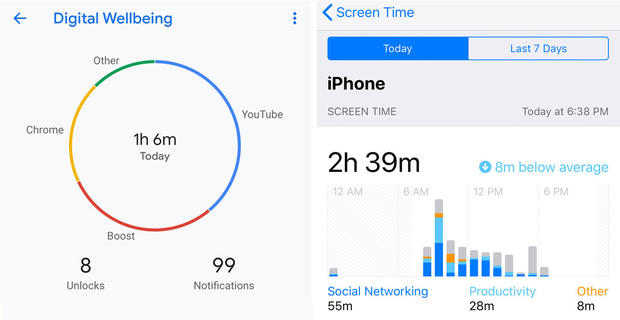Addicted to your smartphone? How to keep track of your screen time
How much time are you spending glued to your phone each day? Google and Apple both have tools to help you manage your screen time on their devices. You can use these features to see how much time you're really spending on your mobile device and which applications you use most often.
Apple's "Screen Time" feature on its iPhones can be found under "Settings." It breaks down in simple charts how long you spent on your phone that day or over the past week, and tells you which types of apps sucked up most of your time.
Google has built a native "Digital Wellbeing" app into its Pixel phones which provides similar data. It also includes an option to set limitations on usage. For other Android devices, there are a number of apps in the the Google Play store that users can download to monitor their mobile device usage.
It's hard to know how your usage stacks up against the average because Apple does not release any aggregate data that could show trends. However, here in our newsroom, we asked our colleagues to send us some of their own screen-time usage metrics. We found, on average, people in our newsroom spent 3 hours and 47 minutes per day on their mobile device.
Instagram and Messages were tied for the most-used apps, followed by Gmail. Other frequently used apps included Safari, Twitter, Facebook and Spotify.
According to the Pew Research Center, more and more Americans are using smartphones as their primary internet device. The study found that one in five adults in the United States are "smartphone-only" internet users who do not have traditional broadband service at home.
And it should come as no surprise that young Americans ages 18 to 29 are especially reliant on smartphones. Nearly 40 percent in that age group say they're online "almost constantly."
Some researchers are looking into whether heavy smartphone use is an addictive behavior and how such heavy usage may affect the brain, especially in growing children.
60 Minutes recently got an inside look at early research from the National Institutes of Health, which is following over 11,000 children into adulthood to paint a holistic picture of development. Those early findings from MRIs show sooner-than-expected "cortical thinning" in young people's brains, although it's unclear whether that will have any impact on their health or development.
60 Minutes' Anderson Cooper spoke to Dr. Dimitri Christakis, the lead author of the American Academy of Pediatrics' most recent guidelines on screen time. Christakis says children are looking to their devices for self-soothing, which could hinder development of internalizing that ability.
Part of the reason we keep checking our devices' screens is the impact of dopamine, a brain chemical associated with happiness, which scientists have found is released when we use technology such as social media.
"There's plenty of scientific research around what is causing those dopamine hits. Some of it is affirmation. Some of it is just stimulus all the time. And that certainly, I think, is a problem, not because of the addictive nature of it but because it keeps us so fixed in the present. There's no time for contemplation," says Amy Webb, CEO and founder of Future Today Institute and professor of strategic foresight at New York University's Stern School of Business.
Features like Apple's Screen Time seem to demonstrate that tech companies may be trying to improve awareness and even promote moderation on their devices — especially at a time when technology companies are increasingly under scrutiny.




